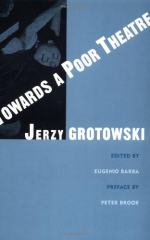
|
| Name: _________________________ | Period: ___________________ |
This test consists of 15 multiple choice questions and 5 short answer questions.
Multiple Choice Questions
1. What British director does Grotowski cite as challenging the theories of Artaud in "He Wasn't Entirely Himself"?
(a) Peter Brook.
(b) Paul Lancaster.
(c) Brecht.
(d) Chekhov.
2. Grotowski states in "Theatre is an Encounter" that Meyerhold's production of "The Inspector General" was a sort of collage of the texts of _____.
(a) Gogol.
(b) Chekhov.
(c) Shakespeare.
(d) Beckett.
3. Whose rhythm exercises does Grotowski find most important?
(a) Brecht's.
(b) Stanislavski's.
(c) Dullin's.
(d) Delsarte's.
4. Faustus is considered not only a saint but also _____.
(a) A super-man.
(b) A deity.
(c) A martyr.
(d) A prophet.
5. The technique of the "holy actor" is _____.
(a) Deductive.
(b) Transductive.
(c) Transcendent.
(d) Inductive.
6. What does Grotowski say that he and his actors are trying to avoid in "Towards a Poor Theatre" (Chapter 1)?
(a) Progress.
(b) Avant-garde.
(c) Eclecticism.
(d) Tradition.
7. What does Grotowski define as "the ability to concentrate in a particular theatrical way and can be attained with a minimum of good-will"?
(a) Hypnosis.
(b) Trance.
(c) Focus.
(d) Connection.
8. Grotowski writes in "He Wasn't Entirely Himself," that "like ____, Artaud knew of Emmanuel's coming, and what it promised."
(a) Kant.
(b) Abraham.
(c) Michael.
(d) Isaiah.
9. What does Grotowski compare the text to in "Theatre is an Encounter"?
(a) A mirror.
(b) A field.
(c) A door.
(d) A prism.
10. How long in the play "Dr. Faustus" does Faustus have to live before his martyrdom of hell?
(a) Twelve hours.
(b) One hour.
(c) Two hours.
(d) One day.
11. In "He Wasn't Entirely Himself", Grotowski writes that _____ was compromised by his disciples.
(a) Chekhov.
(b) Sophocles.
(c) Plato.
(d) Stanislavski.
12. What did the actors wear in the production of "Akropolis"?
(a) Togas.
(b) Bags.
(c) Military uniforms.
(d) Gowns.
13. Who played the role of the King in Grotowski's production of "The Constant Prince"?
(a) Antoni Jaholkowski.
(b) Ryszard Cieslak.
(c) Ludwik Flaszen.
(d) Stanislaw Scierski.
14. What is the name of the institute discussed in "Methodical Exploration"?
(a) Bohr Institute.
(b) Maht Institute.
(c) Ross Institute.
(d) Bryg Institute.
15. Who does Grotowski say asked the key methodological questions of acting in "Towards a Poor Theatre" (Chapter 1)?
(a) Stanislavski.
(b) Artaud.
(c) Chekhov.
(d) Brecht.
Short Answer Questions
1. In "The Theatre's New Testament," Grotowski says that it is "far less risky to be Mr. Smith all one's life than to be" _____.
2. Who wrote the original script of "Dr. Faustus"?
3. What is the name of Grotowski's school?
4. Who did Artaud write a letter to which said, "I am not entirely myself?"
5. Whose work on "physical actions" is incorporated into Grotowski's system?
|
This section contains 396 words (approx. 2 pages at 300 words per page) |

|




